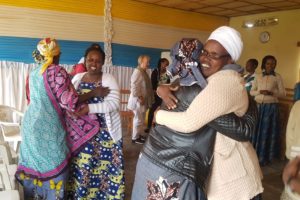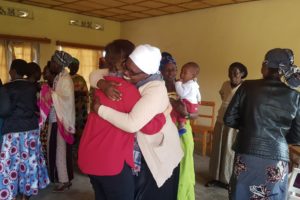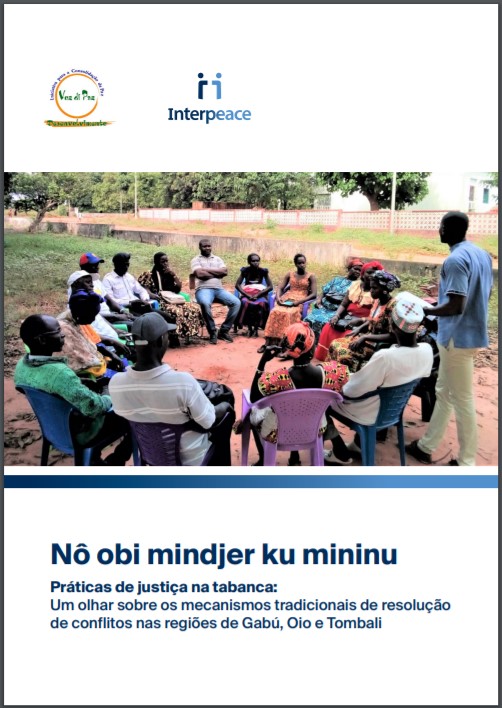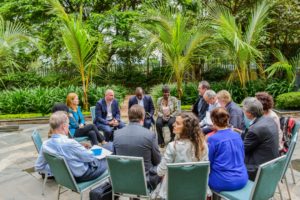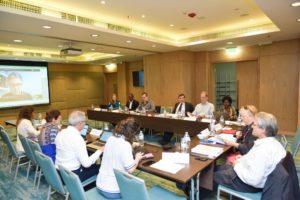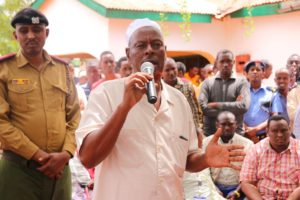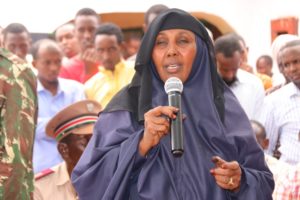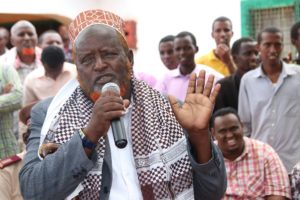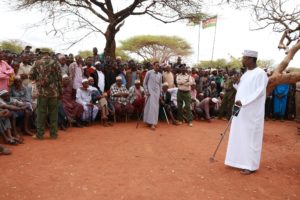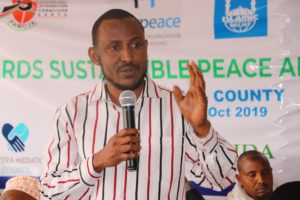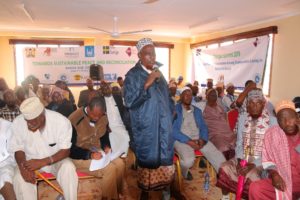It is 11:37am in Muhanga, a town in the southern province of Rwanda and a group of 24 women have gathered despite the drizzle, to welcome a delegation of Interpeace and Never Again Rwanda. These women have all experienced a tragic past, but it’s not until you start talking to them, that this becomes evident. Their testimonies bring to the surface a tragedy that struck their country 25 years ago – the 1994 Genocide against the Tutsis in Rwanda.
Clarisse (not her real name) is a Tutsi woman in her early 50s who married a Hutu husband. They had five children and lived happily together before the genocide brought calamity and hardship to her life. Clarisse’s husband was brutally murdered for marrying a Tutsi, but she escaped death with her children.
However, life for Clarisse after the genocide was unbearable. Living without a husband meant she had to assume unfamiliar roles in a very harsh society, where social cohesion had been disrupted by violent conflict.
“I was rejected by my family because they felt that I had betrayed their trust by marrying a Hutu man. On the other hand, my husband’s family rejected me because they felt that I was the root cause of my husband’s death,” said Clarisse.
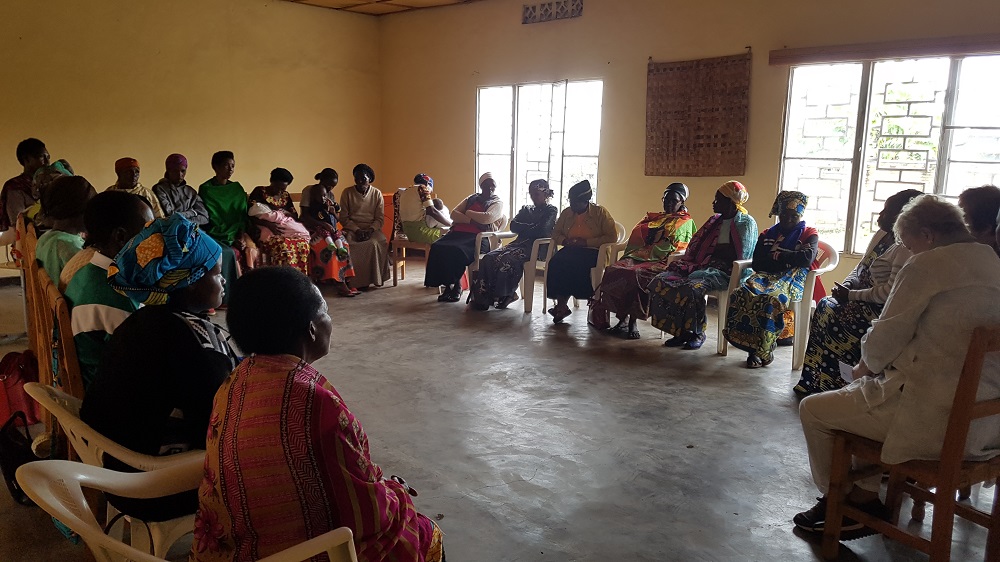
Muhanga, Rwanda. Photo credit: Jude Fuhnwi
Like many survivors of the genocide against the Tutsis, society rejected Clarisse. She explained that people around her interacted, shook hands and hugged each other, but when it came to interacting with her, they just waved. “To make matters worse my children became rebellious against me and I developed hatred towards them,” she added
As the rejection and stigma deepened, Clarisse became depressed and attempted to take away her own life on different occasions. Clarisse was not alone. Many survivors of the genocide shared similar or even worse experiences.
“I was silent about what was happening to me and had a lot of self-hatred. I am Hutu and was married to a Tutsi. Got a lot of hatred from my family. His family did not accept me either. I transferred all the hatred to my child, and he hated me because I had no family. I was going to commit suicide,” explained Anne, another member of the group who survived. “But the psychotherapist supported me. We had a joint session with my child, and she explained to him that it was not my fault,” she added.
A mental-health survey from Rwanda’s Ministry of Health in 2018 showed that genocide survivors suffer a higher prevalence of depressive disorders, post-traumatic stress, panic and drug abuse than the population as a whole.
- Muhanga, Rwanda.
- Photo credit: Jude Fuhnwi
Interpeace and its partner in Rwanda, Never Again Rwanda (NAR) have been supporting the healing and reconciliation process in the country for many years. In 2015, we began implementing the societal healing and participatory governance programme funded by the Swedish International Development Cooperation Agency (SIDA) and the European Commission.
Since then, the societal healing and reconciliation component of the programme has created 15 spaces for peace, where people in different communities across Rwanda openly discuss the sensitive past of the country and related psychological wounds.
When Clarisse was called to join the group in Muhanga, she came with fear that everyone would isolate her. But her worries were misplaced.
“I was welcomed with open arms not only by the facilitators but group members as well. Through listening to group members’ testimonies, I learned to accept myself, acknowledged what I went through and began my healing journey,” said Clarisse, adding that “today I no longer feel hurt by what other people think about me. Instead of showing anger towards them, I express love.”
These spaces have opened dialogue between people in the communities, reconciled many and empowered them economically. The spaces are co-facilitated by NAR psychotherapists and peace agents selected from the communities.
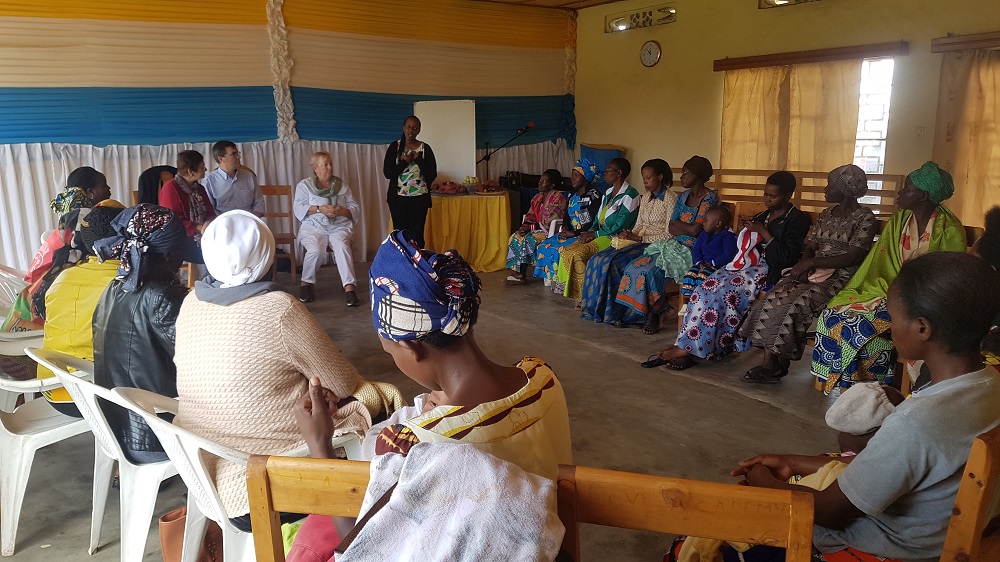
Muhanga, Rwanda. Photo credit: Jude Fuhnwi
Our spaces for peace project in Muhanga ended in 2018 after supporting 30 women, aged between 27 and 65, to heal from wounds of the past. However, these beneficiaries have continued to meet after the project phased out.
“We draw our strength from each other. We are on a journey and we must continue,” said a member of the group when the Interpeace and NAR delegation visited on Wednesday, 4 December 2019.
On their own initiative, they are helping each other to heal and empowering group members through income generating activities.
“They established 3 smaller groups for members based on their proximity. Each of these groups developed an income generating activity to support their economic needs and still continue to engage in discussions for healing,” said Emelienne Mukansoro, Never Again Rwanda’s Psychotherapist in Muhanga.
Members of the group have taught each other different skills in embroidery and market gardening, work together and share proceeds from the sale of their produce.
“We use our hands to become productive and our hearts to feel peaceful,” said one member of the group. Another one added: “We have built ourselves up and will keep going by helping other women to do the same”.
Depressive disorders and post-traumatic stress have damaging effects on societies. Interpeace and NAR have continued to work with Rwandan authorities, the Ministry of Health and communities to support mental health and trauma healing to advance social cohesion in Rwanda.
“It’s been very inspirational, powerful testimonies. They are doing amazing work on mental health and we in Northern Ireland have much to learn from Rwanda on this,” said Monica McWilliams, Chair of Interpeace Governing Board.
Interpeace and the Rwanda Ministry of Health met in Kigali with local and international partners on 4 December 2019, to discuss a scale up of our work on mental health and trauma healing to nurture social cohesion. This new programme will provide psychosocial group support therapy at all administrative levels in Bugesera District, which was hard-hit by the genocide. It will also innovatively introduce mental health support at the level of individuals with particular needs, as well as offer life and vocational skills training, as additional elements contributing overall to social cohesion.
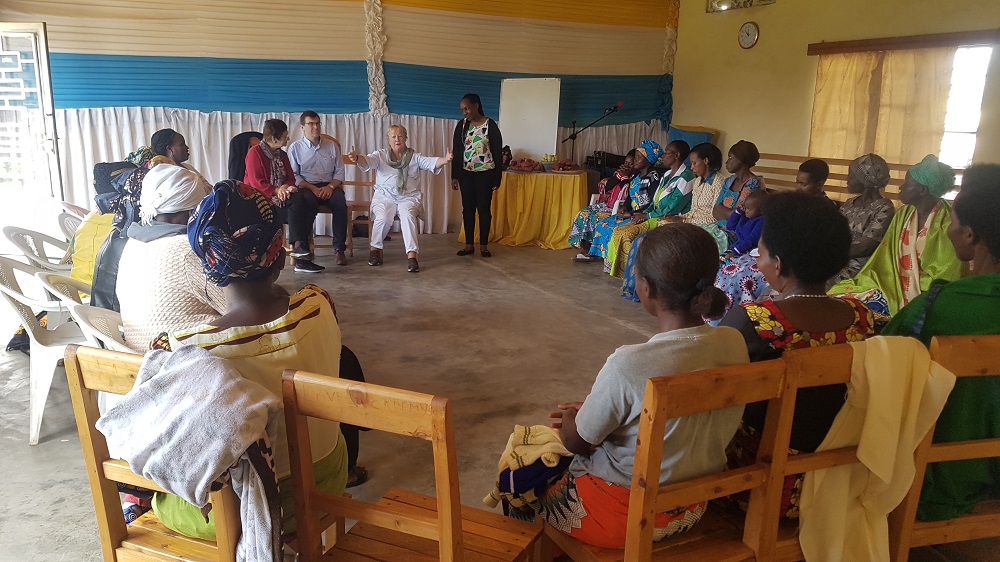
Muhanga, Rwanda. Photo credit: Jude Fuhnwi
*Names of victims changed or not mentioned for privacy reasons
In many developing countries, traditional or informal justice systems are responsible for the resolution of over 80% of conflicts in a community. These conflict resolution mechanisms play a significant role in rural and urban areas worldwide, addressing matters ranging from local crime to protection of land and property, to issues concerning the resolution of family disputes and inheritance. As a result, these practices and traditions are deeply entrenched in local populations and pre-date formal justice systems. In most cases, these practices offer benefits in costs and physical accessibility. However, research has shown that these conflict resolution mechanisms disproportionately affect women and children.
In Guinea-Bissau, traditional conflict resolution mechanisms are deeply rooted in the costumes of the different communities of the country. In 2019, as part of a larger programme, UNDP and UNICEF, funded by the Peacebuilding Fund, asked Interpeace and Voz di Paz to develop a project of “Technical Support to Strengthen the Integration of Traditional Justice in the Stabilization of the Justice Sector in Guinea-Bissau through Peacebuilding.” The project included a participatory research process, which resulted in the publication of a report that seeks to contribute to a discussion about traditional mechanisms of conflict resolution, focusing on the conflicts involving women and children. Research was conducted through six focus-groups in three regions of the country. These results were then validated through a participatory process. The study focuses on exploring the traditional justice system in Guinea-Bissau, by focusing on women’s issues, the treatment of children in traditional justice and the perception of the population regarding traditional and formal justice systems.
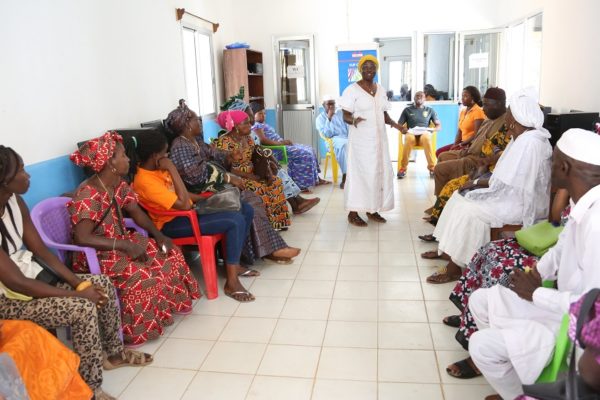
Photo credit: Voz di Paz
The study showed that traditional conflict resolution mechanisms in Guinea-Bissau are centered on dialogue and reconciliation and are guided by people who have historical and/or religious importance in the community – village chiefs, elders, imams, priests and the committees established after independence. Therefore, the application of traditional justice is versatile and depends on the attitude of the actor who applies it. Regarding the treatment of women, there was an idea that was often raised: women have a subordinate position vis-à-vis men – and especially their husbands – and must "sufri" (resign themselves). As a result, in the opinion of many of the women consulted, their problems are not solved impartially and fairly by traditional justice mechanisms. Concerning children, their position is subordinate to older people, and are very rarely given the opportunity to speak during these proceedings.
To promote peaceful and inclusive societies there must be an effort to improve traditional justice systems in developing countries. Therefore, during the participatory validation session, key recommendations were raised to improve these practices in Guinea-Bissau: a) including women and youth in councils that mediate conflicts in communities, can strengthen their participation and ensure greater openness; b) allow men and women to be present and listened to equally, can make the procedures more inclusive; c) village chiefs and committees should work to promote transparent decision-making processes in order to improve legitimacy and impartiality of traditional justice; and lastly, c) improve respect for the rights of women and children in traditional justice. The report also includes recommendations for institutions and organizations working with the traditional justice systems.
Read full report in Portuguese here.
Read Executive Summary in English here.
Read Executive Summary in French here.
Dr Agnes Abuom, moderator of the Central Committee of the World Council of Churches and director of TAABCO Research and Development Consultants, is the newest member of Interpeace’s Governing Board. Dr Abuom was formally announced as member of the Board on Tuesday, 3 December 2019, during the board’s biannual meeting in Kigali, Rwanda.
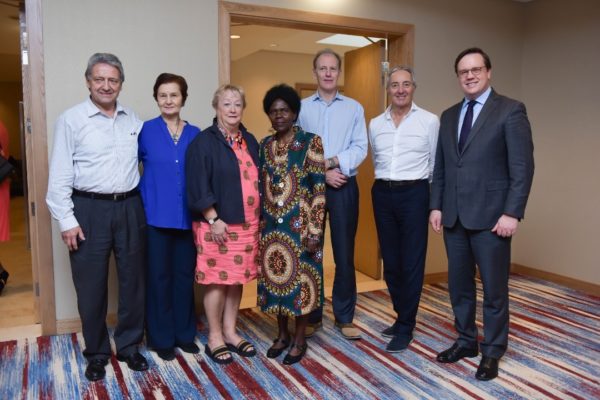
Matthias Stiefel, Necla Tschirgi, Monica McWilliams, Agnes Abuom, Andrew Gilmour, Martin Aked and Scott Weber. Photo credit: Interpeace
Dr Abuom is a committed peacebuilder, gender and human rights advocate. She has a wealth of knowledge and experience in ecumenical, community work and peacebuilding in the Horn of Africa and other parts of the world. She was elected Moderator of the Central Committee of the World Council of Churches (WCC) in 2013 at its General Assembly in Busan, South Korea. She is the first woman and the first African to hold the position.
Dr. Agnes Abuom has been active with WCC since 1975, including working for the organization in Switzerland, Sudan and Zimbabwe. She served as WCC Africa president from 1999 to 2006. She has also worked for the Anglican Church of Kenya on development and civic programs and served as a member of the Advisory Committee for Peace of All Africa Conference of Churches, the African Council of Religious Leaders (ACRL), Religions for Peace, and National Council of Churches of Kenya.
“I am thrilled to serve on the Governing Board of Interpeace. The work of peace requires that everyone plays a role. Interpeace’s wisdom, experience and its commitment to give a voice to and build capacities of local communities contributes to sustainable peace,” said Dr. Abuom.
She added: “Interpeace’s vision to create safe spaces for reconciliation and sustainable peace, resonates with my faith. As the President of Interpeace says, peace is a calling. This is what has inspired me to serve on this board.”
- Governing Board Meeting in Kigali.
- Photo credit: Interpeace
Dr. Abuom’s involvement in politics forced her into exile in 1976 to Sweden where she later studied and obtained a degree in education and a doctorate in missiology. She leads TAABCO Research and Development Consultants - a consulting firm for civil society and aid organisations - as the director.
“Agnes’s experience will greatly enrich our efforts to support home-grown solutions to conflict and to build on the resilience already present in societies,” said Scott Weber, President of Interpeace.
She has previously served as a member of the Interpeace Eastern and Central Africa Board.
The Interpeace Governing Board is the highest decision-making body of the organization and plays a key role in defining Interpeace’s overall strategy. It is the legal authority that is responsible for the organization.
The Governing Board is made up of prominent individuals from the government, international, and business sectors. There is also a seat for the host government, Switzerland, and a designated representative of the United Nations Secretary-General.
We are sad to announce the death of Mambo Zawadi, programme coordinator at Sofepadi, our local partner in the Democratic Republic of Congo (DRC). Mrs Zawadi and her husband died in a plane crash this Sunday, 24 November 2019.
The couple were returning to Beni from a family visit in Bukavu, when the plane went down shortly after take-off in Goma, a city in the East of DRC. The plane was carrying 17 passengers - including Ms Zawadi and her husband – and two crew members.
We have lost a dear friend, valued colleague and courageous peacebuilder.
“I have learned of the tragic death of our colleague in DRC, Mrs Mambo Zawadi and her husband in a plane crash near Goma. My deepest condolences to her family and all our brave colleagues,” Scott Weber, President of Interpeace writes on Twitter.
Mambo’s death is an irreplaceable loss, but we will be there to help her team to continue to build a safer DRC for all.
We will be working closely with our partner Sofepadi in the coming days and weeks to offer them as much support as we can at this difficult time, and to ensure their great work and the work that Mambo heartily believed in continues.
Our hearts and prayers go out to Mambo’s family and all those affected by Sunday’s crash. Mambo’s memory will live on in all that we do, for many years to come.
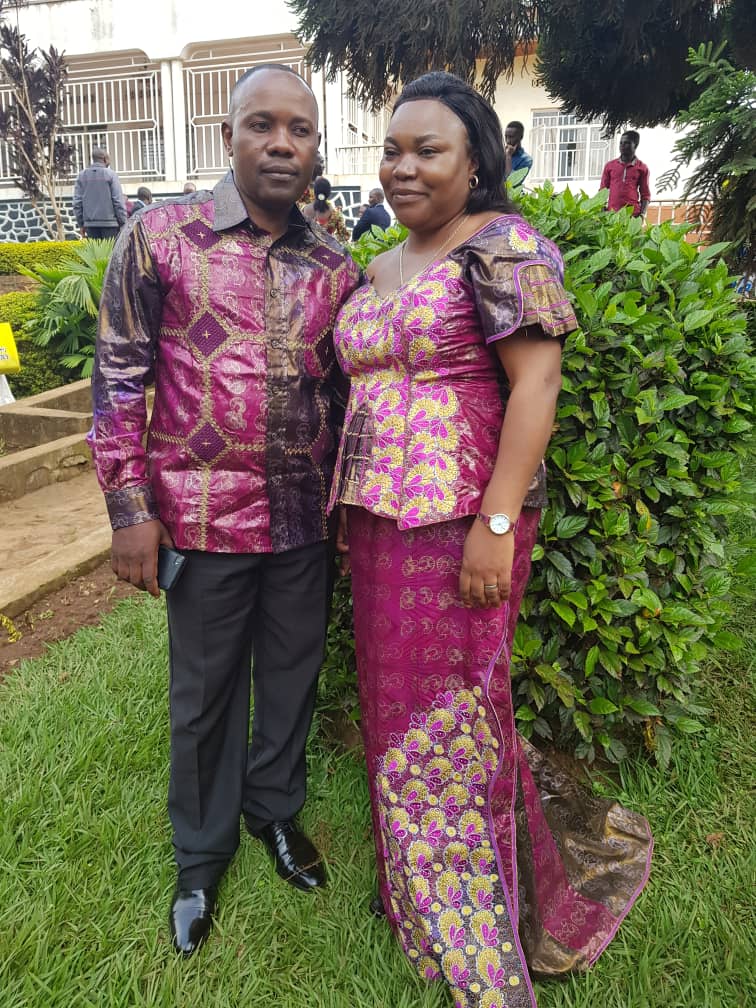
Ms Mambo Zawadi and her husband
Our new initiative, “Principles for Inclusive Peace” is among 10 of the most promising governance projects presented at the 2019 Paris Peace Forum (PPF) that ended in the French capital on 13 November. The project was chosen from over 700 initial submissions and 114 projects presented at the Forum.
“Principles for Inclusive Peace” is a project initiated by Interpeace and co-led by the Swedish Ministry for Foreign Affairs to open a global participatory process and establish a new normative framework and standard to guide inclusive and effective peace processes around the world. Interpeace developed the initiative after identifying fundamental challenges to peace processes today – as a fresh new approach to re-think the way these processes are conceived and structured.
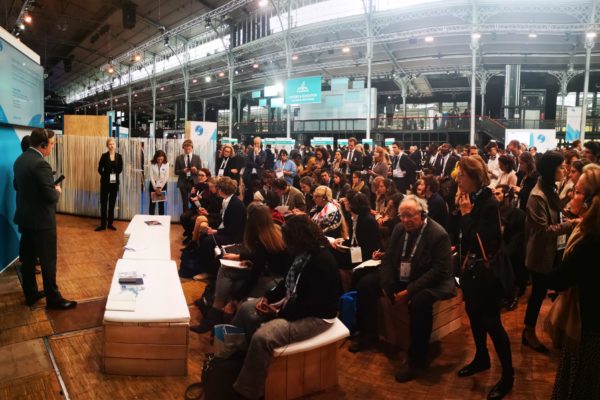
Paris Peace Forum 2019. Photo credit: Interpeace
Announcing the selected projects for short-list of ten at the closing ceremony of the Paris Peace Forum, Trisha Shetty of the scale-up projects committee said: “We will provide mentorship to these 10 new projects. We will follow up with them; we will ask them how we can be of service, what is the best marriage we can have between our team and the project members”.
“This is a recognition of the critical need to re-think peace processes from a conceptual and practical point of view, but also to do it in a collective way so that robust principles can guide all those who will be leading peace efforts in the future,” said President of Interpeace, Scott Weber.
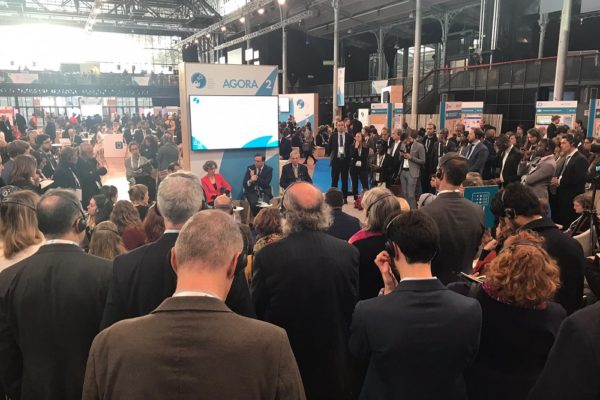
Paris Peace Forum 2019. Photo credit: PPF
Other projects selected for the scale-up projects include “Model Drug Law – West Africa” submitted by the Global Commission on Drug Policy as well as projects from the United Nations Entity for Gender Equality (UNWomen), International Labour Organization among others.
The second edition of the Paris Peace Forum, an annual international event for global governance and multilateral issues ended this Wednesday, 13 November 2019, after two days of intense conversations, talks, panels and debates.
To learn more about our initiative, visit the website: principles4inclusive.org. We encourage all people who are interested in the subject to share their insights and contribute to this initiative, by subscribing to our Newsletter and/or writing a message through the website’s platform.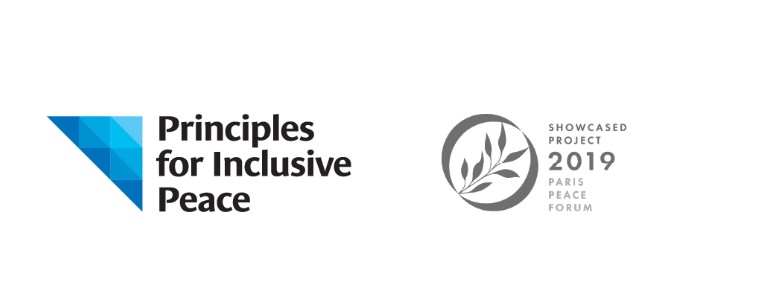
Le français suit
It is a sunny morning in Shobtoy village, Doomal, a small village in Banisa constituency in the Mandera county of north-eastern Kenya. A cool breeze softens the heat of the rising sun and people move around with smiles on their faces. This was not the atmosphere few weeks back when people struggled to suppress stubborn tears, spoke with quavering lips and hands trembling.
Shobtoy Village was raided at the time by armed militia, in a retaliatory attack that killed at least 15 people. But there are no noticeable signs of distress here now, until you start talking to people.
In an arid region where water is scarce and many people rely on pastoral farming as a source of livelihood, competition for meagre resources means disputes over land and other resources.
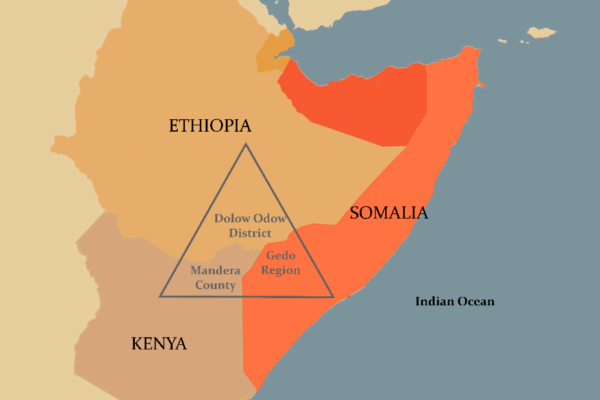
An unnamed elder in Banisa quoted by a local news source said “the Degodia clan does not want this Garre community back in Malka-ruka area and we believe this is the cause of this raid to send that message.”
Early September’s attacks were not the first. Mandera County has suffered several deadly clashes over the years linked to inter-clan conflicts on resource sharing, mainly among the Degodia and Garre clans.
The intercommunal clashes resurfaced in this area near the Kenya-Ethiopian border with revenge attacks fueling violence across borders. The latest attacks are linked to a local militia believed to be from the Degodia clan which attacked Shobtoy village in Doomal, inhabited by the Garre.
Until recently, the surge in violent attacks over the years between the Garre and Degodia clans has given little hope that violence is close to being contained, despite a ceasefire agreed by both clans in July 2014.
But the fears for more violence are fading away. The National Cohesion and Integration Commission (NCIC) of Kenya and Interpeace are working to stem the violence and bring lasting peace between the warring communities, by reconciling them and building trust.
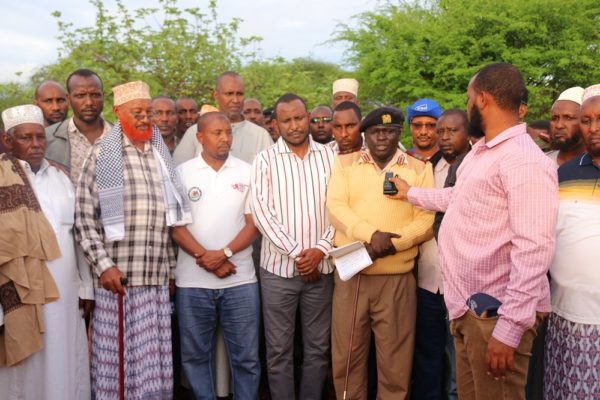
Banisa, Kenya. Photo credit: NCIC
“Our peacebuilding programme with the NCIC has established dialogue spaces in communities, where people are encouraged to identify and report persons carrying out violent activities and fueling clan feud. Now the communities trust the security forces. People in Malka Mari division of Banisa arrested five perpetrators of the latest violence in September and handed them to security forces with an AK47 rifle. The Gare Clan of Banisa also did the same in 2018 when they handed in similar criminals. They no longer hide culprits,” said Hassan Ismail, Kenya Country Representative at Interpeace.
Following the deadly retaliatory clashes in September 2019, the NCIC with support from Interpeace, spearheaded a dialogue meeting in the town of Banisa in Mandera county. The three-day meeting held from 17 to 19 October. Community elders, religious leaders, elected leaders, representatives of parties to the conflict and various peace actors all met and agreed to end the violence between Garre and Degodia clans, and to work together for lasting peace after years of conflict.
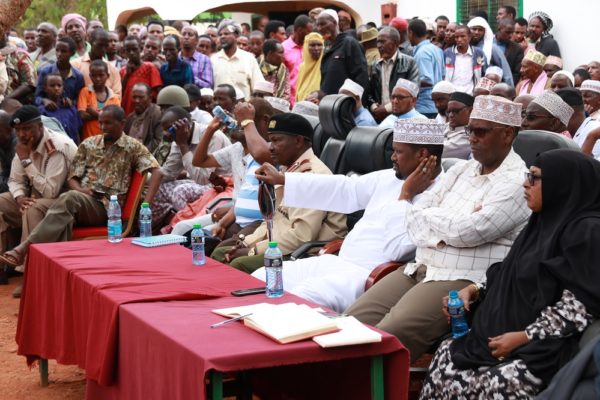
Banisa, Kenya. Photo credit: NCIC
“This is the first time, after the July 2014 ceasefire brokered by NCIC, that we are having all stakeholders sit together, dialogue and resolve in writing to end violence and live in harmony,” explained Mr Ismail.
The reconciliation meeting defused the rising tension and saw, for the first time, a written commitment to peaceful coexistence by participants – a hopeful sign for sustainable peace in the troubled Mandera triangle in the Horn of Africa where Kenya, Ethiopia and Somalia meet.
"Many lives were lost. But the speed at which the conflict was contained shows increased resilience of the community and a great shift from the culture of retaliation and revenge. We thank the people of Banisa for taking lead in building their own peace. As NCIC, our main role is to provide facilitation support," said Dr. Sellah King’oro, Assistant Director of Research, Policy and Planning at NCIC.
The National Cohesion and Integration Commission (NCIC) of Kenya and Interpeace remain committed to providing the most suitable support possible to sustain the peace agreement.
- Banisa, Kenya.
- Photo credit: NCIC
“The NCIC-Interpeace programme funded by the Germany Foreign federal office is a 3-year programme that ends in 2021. We shall continue to support and build capacity of local peace infrastructures so that peace is maintained. The programme will continue to offer more facilitation support to the people of Mandera,” Dr. Sellah added.
Since 2015, the NCIC and Interpeace have carried out research in consultation with communities in Mandera county, identified several impediments to peaceful coexistence and are now helping them to address violent conflict.
Increased tensions between communities have sometimes undermined trust between security forces and the population in conflict-hit regions across Africa. Interpeace is working closely with partners to foster trust and collaboration between the security sector and populations in Kenya and Mali for lasting peace.
Watch Kenya NTV’s news report on the reconciliation meeting in Banisa here.
Kenya’s Elgeyo Marakwet County government has recognized our peacebuilding work and included our intervention on their county profile. You can read more about it on their website here
- Banisa, Kenya.
- Photo credit: NCIC
Aux côtés de communautés kényanes pour des solutions durables face aux affrontements inter-claniques
C’est un matin ensoleillé à Shobtoy Village à Doomal, petite collectivité de la région de Banisa dans le comté de Mandera au nord-est du Kenya. Une brise froide adoucit la chaleur du soleil levant et la population se déplace le sourire aux lèvres. Mais cet environnement n’était pas celui d’il y a quelques semaines lorsque les gens peinaient à éliminer des larmes tenaces et parlaient d’une voix tremblante.
Shobtoy Village était alors attaqué par des milices armées dans des représailles qui a tué au moins 15 personnes. Actuellement, aucun signe distinctif de détresse n’est observé ici, grâce aux efforts récents menés par la Commission nationale kényane pour la cohésion et l’intégration (NCIC) et Interpeace. Cette souffrance ne revient que dans les discussions.
Dans une région aride où l’eau est rare et où de nombreuses personnes puisent leurs revenus dans l’élevage, la compétition pour de maigres ressources signifie souvent des disputes, notamment liées aux terres. Un homme de Banisa, cité par une source locale, a affirmé que « le clan Degodia ne veut plus de cette communauté Garre dans la zone de Malka-ruka » et que « nous croyons que ce message est la raison de ce raid ».

Les attaques de début septembre n’étaient pas les premières. Le comté de Mandera a subi plusieurs tensions mortelles ces dernières années liées aux conflits entre clans sur la répartition des ressources, surtout entre les communautés Degodia et Garre.
Ces violences ont refait surface dans cette zone près de la frontière éthiopienne. Des vengeances les ont alimentées des deux côtés de cette séparation. Et la dernière vague a été lancée par une malice locale qui serait membre du clan Degodia et qui s’en est pris à Shobtoy Village, habité par les Garre.
Jusqu’à récemment, l’augmentation des attaques entre ces deux populations n’avait laissé que peu de perspective d’une possible limitation des violences malgré un cessez-le-feu approuvé par les deux clans il y a cinq ans. Mais cette situation semble s’améliorer. La NCIC et Interpeace oeuvrent pour mettre un terme à la violence et contribuer à une paix durable entre les parties en les aidant à se réconcilier et à établir de la confiance.
« Notre programme de consolidation de la paix avec la NCIC a lancé des espaces de dialogue dans les communautés où la population est encouragée à identifier et signaler des personnes responsables d’activités violentes et d’alimenter des dissensions entre clans », affirme le représentant d’Interpeace au Kenya, Hassan Ismail. « Des personnes ont arrêté cinq perpétrateurs des violences de septembre dans la division Malka Mari de Banisa et les ont remis aux forces de sécurité avec un AK47. Le clan Garre de Banisa avait fait la même chose en 2018. Ils ne cachent plus les responsables », ajoute-t-il.

Banisa, Kenya. Photo credit: NCIC
Après les représailles mortelles de septembre dernier, la NCIC, soutenue par Interpeace, a mené une réunion de dialogue dans la ville de Banisa. Du 17 au 19 octobre, des anciens des communautés, des dirigeants religieux, des élus, des représentants des parties au conflit et différents acteurs de paix se sont rassemblés et ont accepté de mettre un terme aux violences entre les deux communautés et d’œuvrer ensemble à une paix durable après des années de conflit.
C’est la première fois après le cessez-le-feu d’il y a cinq ans, arraché par la NCIC, que tous les acteurs se sont assis en semble, ont dialogué et ont trouvé un compromis, explique M. Ismail. La réunion a désamorcé les tensions grandissantes et a abouti pour la première fois à un engagement par écrit à une coexistence pacifique. Une plateforme prometteuse pour une paix durable dans la zone troublée de Mandera, à la rencontre du Kenya, de l’Ethiopie et de la Somalie.

Banisa, Kenya. Photo credit: NCIC
« De nombreuses vies ont été perdues. Mais la Vitesse à laquelle le conflit a été limité montre la résilience grandissante des communautés et un important changement de la culture de représailles et de vengeance », selon le sous-directeur de la recherche, de la politique et de la planification à la NCIC, Sellah King’oro. « Nous remercions la population de Banisa d’avoir pris la direction de l’établissement de leur propre paix. Notre rôle principal comme NCIC est d’apporter un soutien en termes de facilitation ».
Cette institution et Interpeace restent engagés pour accompagner ces clans vers une paix durable. Ce programme de trois ans, financé par le ministère allemand des Affaires étrangères, est prévu jusqu’en 2021. « Nous allons continuer de soutenir et d’établir des capacités d’infrastructures de paix locales », insiste Mme. Sellah.
Depuis quatre ans, les deux organisations ont mené des consultations dans les communautés, ont identifié plusieurs obstacles à une coexistence pacifique et ont assisté la population pour aborder la question des violences. L’augmentation des tensions entre communautés ont parfois sapé la confiance entre les forces de sécurité et les citoyens dans les régions affectées par des conflits en Afrique. Interpeace oeuvre avec des partenaires notamment au Kenya et au Mali pour améliorer le lien entre ces acteurs.
- Banisa, Kenya.
- Photo credit: NCIC
Vous trouverez sur ce lien le reportage en anglais de la chaîne de télévision kényane NTV.
Le gouvernement du comté d’Elgeyo Marakwet mentionne le travail conjoint de la NCIC et d’Interpeace dans leur profil du comté disponible sur ce lien.
